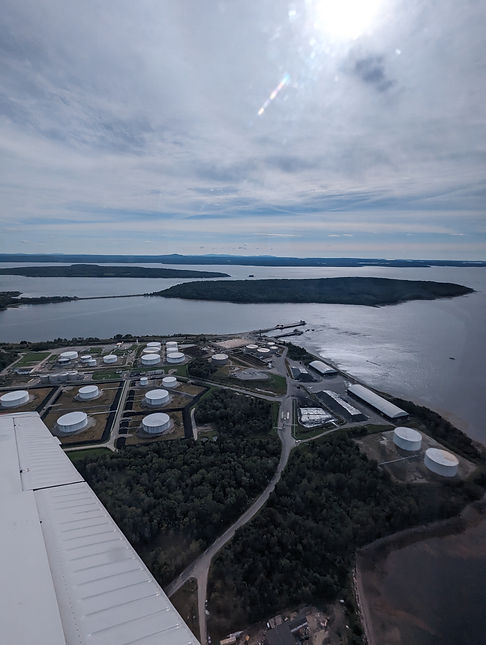Advocacy to Protect Sears Island

View of Mack Point (foreground) and Sears Island (background). Photo captured during Lighthawk flight.
Our Position
We cannot support the destruction of green space in the name of green energy. Sears Island is a place of significant ecological and recreational importance in the region, and one of the largest undeveloped islands on the Eastern Seaboard of the United States. Construction of this terminal will result in destruction of critical marine habitat and impact fisheries, and its operation will disrupt migratory birds nesting on the island and take away from the recreational opportunities afforded by such a unique place. Should an offshore wind terminal be built in the Penobscot Bay region, Mack Point is the location for it. Mack Point has been an industrial site for more than a century, and redevelopment of this port could allow for the construction of an offshore wind terminal in an already industrialized area while keeping Sears Island intact.

Alliance for Sears Island
In the fall of 2023, Upstream Watch joined the Alliance for Sears Island, which currently includes Belfast Bay Watershed Coalition, Campaign to Protect Sears Island / Wahsumkik, Friends of Sears Island, Friends of Maine Coastal Islands National Wildlife Refuge, Friends of the Harriett Hartley Conservation Area, Islesboro Islands Trust, Preserve Rural Maine, Public Employees for Environmental Responsibility, Sierra Club Maine Chapter, and a growing number of individuals — all eager to maintain the ecological integrity of Penobscot Bay even as we combat the climate emergency. It is the position of the Alliance that if an offshore wind port is to be constructed in Penobscot Bay, Mack Point, not Sears Island, should be the location.


In June 2024, Sprague Energy hosted tours at their Mack Point facility in order to demonstrate how they could redevelop the site to accomodate the off shore wind port.
The Mack Point Alternative
The Mack Point terminal, located in Searsport and approximately 800 yards across Penobscot Bay from Sears Island, is currently home to an intermodal port facility serving coastal and inland areas of Maine. Mack Point handles a diverse array of product including bulk shipments as well as project and containerized cargo, with space for laydown, bulk piling, warehousing and liquid tank storage as well as a potential for further development on the existing property. Sprague Energy is the operator of Mack Point. The company owns the liquid bulk pier, while the Maine Port Authority owns the dry bulk pier. Additionally, there is existing rail infrastructure at the port.
Sprague Energy supports the redevelopment of Mack Point to accommodate the offshore wind port, and hired their own consultants to assess the feasibility and redesign the port. Construction of the offshore wind port at Mack Point rather than Sears Island allows both the pursuit of offshore wind and the protection of Sears Island. Sprague shared their plan with Maine DOT, and opened their facility up for public tours to demonstrate what redevelopment of their site would look like.

Maine's Pursuit of an Offshore Wind Port at Any Cost
The State of Maine, in their unrelenting pursuit of developing Sears Island, seems determined to ignore or find ways around existing state and federal environmental protections to make this project a reality.
This spring, at the end of the legislative session, the bill LD 2266, “An Act Regarding Offshore Wind Terminals Located in Coastal Sand Dune Systems” was put forth by the Governor’s office just five days before a public hearing. The bill sought to exempt a sand dune on Sears Island from current state environmental protections to explicitly allow for the advancement of an offshore wind port and staging area on the island.
Despite being voted down in the house, the bill ultimately passed both the house and senate and was signed by the Governor. This bill highlights the inadequate planning by the State as it relates to siting offshore wind projects, sets a dangerous precedent for future impacts from any development to coastal ecosystems, and runs counter to the efforts of the State and local communities to address the climate crisis.
On April 13, 2024 two citizen scientists, one with degrees in both plant ecology and conservation biology and the other with long-term use of Sears Island for nature study, observed three vernal pools on MDOT’s Sears Island parcel, took pictures, and recorded their data following Maine State Vernal Pool Assessment protocols. They found 140 wood frog and 50 spotted salamander egg masses in one pool, 60 wood frog and 20 spotted salamander egg masses in another and 95 wood frog with 40 spotted salamander egg masses in the third pool. They submitted their findings to MDOT, which was met with a response requesting proof that the Maine Department of Transportation provided permission to access the property. DOT followed up with the reply: “MaineDOT hired a qualified consultant to complete vernal pool surveys on this parcel this spring as well. We are looking at the data that they collected to compare to your information. For consistency, we prefer to use our qualified consultants’ information for submittal on these pools to IF+W.”

